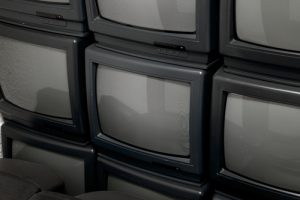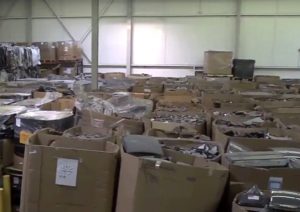Millions of pounds of CRT devices abandoned by Utah’s Stone Castle Recycling continue to plague local communities.

Millions of pounds of CRT devices abandoned by Utah’s Stone Castle Recycling continue to plague local communities.
 As information comes to light about widespread landfilling of CRT glass in California, electronics recycling standards R2 and e-Stewards are working to determine their next steps.
As information comes to light about widespread landfilling of CRT glass in California, electronics recycling standards R2 and e-Stewards are working to determine their next steps.
 Com2 Recycling Solutions is opening a facility in Georgia as it expands its capacity to produce a glaze product from CRT glass. The glaze is currently used on tile products made by Brazilian manufacturers.
Com2 Recycling Solutions is opening a facility in Georgia as it expands its capacity to produce a glaze product from CRT glass. The glaze is currently used on tile products made by Brazilian manufacturers.
E-scrap recycling company Regency Technologies has partnered with Dlubak Glass Company, a processor of scrap TV and PC monitors, on a joint operation that will recycle CRT glass.
 UNICOR, also known as Federal Prison Industries, has shut down its electronics recycling facilities at several prisons across the country, leaving a sizable gap in the U.S. e-scrap recycling chain.
UNICOR, also known as Federal Prison Industries, has shut down its electronics recycling facilities at several prisons across the country, leaving a sizable gap in the U.S. e-scrap recycling chain.
 New York state regulators have fined a recycling facility for allowing lead and other hazardous materials to seep into the ground last summer.
New York state regulators have fined a recycling facility for allowing lead and other hazardous materials to seep into the ground last summer.
 Millions of electronics sit unused in Wisconsin homes, according to a report from the state’s e-scrap program, and awareness of recycling options is growing. Continue Reading
Millions of electronics sit unused in Wisconsin homes, according to a report from the state’s e-scrap program, and awareness of recycling options is growing. Continue Reading
 Despite having a CRT glass recycling furnace in place in New York, Nulife Glass has for years had difficulty coming into compliance with state facility rules.
Despite having a CRT glass recycling furnace in place in New York, Nulife Glass has for years had difficulty coming into compliance with state facility rules.
CRT glass may be heading to California landfills — legally.
Two executives of a Colorado electronics recycling firm were indicted by a federal grand jury on charges related to allegations that it illegally exported over 100,000 end-of-life CRTs overseas.
